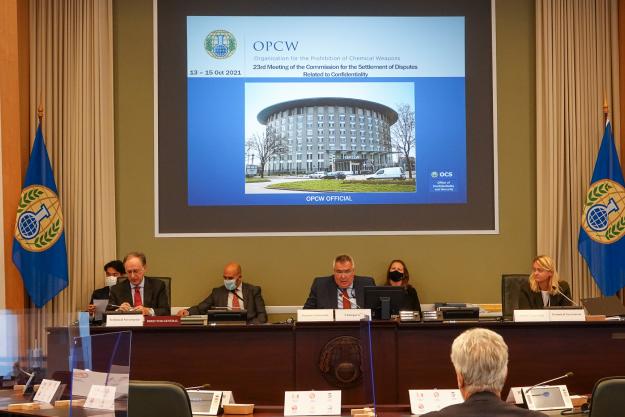The Organisation for the Prohibition of Chemical Weapons (OPCW) Commission for the Settlement of Disputes Related to Confidentiality elected Mr Amine Sid as its new Chairperson during its annual meeting, held from 13 to 15 October at the Organisation's Headquarters in The Hague.
OPCW Director-General, H.E. Mr Fernando Arias, delivered the opening speech. In his speech, the Director-General underlined that the OPCW Technical Secretariat maintains "a stringent regime governing the handling of confidential information" in which the Commission plays a significant role. The Director-General added: "Confidentiality of information is critical to the ability of the OPCW to fulfil its mission." The Director-General concluded by stating that with members' "deep pool of legal, diplomatic, and disarmament experience, the Confidentiality Commission remains well equipped to fulfil its responsibilities."
Mr Sid stated: "It is a great honour for me to chair this important subsidiary organ of the OPCW in charge of the settlement of disputes related to confidentiality. My mission is to facilitate and encourage open and frank discussions among the members, for the purpose of reinforcement and consolidation of the confidentiality regime under the Chemical Weapons Convention."
In addition to electing a new Chair, delegates also practiced a mock scenario in an ongoing effort to review the Commission's procedures.

Background
Mr Amine Sid is an Algerian career diplomat who has previously served in The Hague as a Deputy Permanent Representative to the OPCW and in a variety of posts in multilateral diplomacy, including at the non-proliferation and disarmament department in Algiers.
The Commission for the Settlement of Disputes Related to Confidentiality is a subsidiary organ of the Conference of the States Parties (CSP) to the Chemical Weapons Convention (CWC). The Confidentiality Commission is authorised to consider disputes relating to breaches of confidentiality involving State Parties and the OPCW.
The Commission has 20 members who are appointed by the Conference of the States Parties for a term of two years and are proposed by OPCW's five regional groups: Africa, Asia, Eastern Europe, Latin America and the Caribbean, Western European and Other States. The Chair is elected by consensus from among the members of the Confidentiality Commission and serves a one-year term.
As the implementing body for the Chemical Weapons Convention, the OPCW, with its 193 Member States, oversees the global endeavour to permanently eliminate chemical weapons. Since the Convention's entry into force in 1997, it is the most successful disarmament treaty eliminating an entire class of weapons of mass destruction.
Over 98% of all declared chemical weapon stockpiles have been destroyed under OPCW verification. For its extensive efforts in eliminating chemical weapons, the OPCW received the 2013 Nobel Peace Prize.






